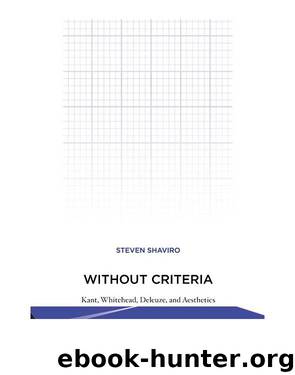Without Criteria by Steven Shaviro

Author:Steven Shaviro [SPi]
Language: eng
Format: epub
ISBN: 9780262195768
Publisher: MIT Press
5
God, or The Body without Organs
God is the most perplexing figure in Whitehead’s metaphysics. Who is he, what does he want, and what is he doing in Process and Reality? Whitehead’s thought is entirely about process and transformation; it values becoming over being, relation over substance, and continual novelty over the perpetuation of the same. It rejects the “bifurcation of nature” (Whitehead 1920/2004, 30-31), or the separation of reality from appearance (1929/1978, 72). It holds that there is nothing besides “the experiences of subjects” (167); and it grants to all subjects—including inhuman and nonsentient ones—and to all their experiences—conscious or not—the same ontological status. Such a thought has no room for a specially “eminent” entity: one that would be absolute, unchanging, transcendent, and supersensible, as God is usually taken to be. Given Whitehead’s rejection of traditional metaphysics and theology, why does God remain such a “stubborn fact” throughout Process and Reality? What role does this God play in Whitehead’s cosmological system?1
1. For the purposes of this chapter, I deliberately ignore the extensive literature on "process theology." Instead, I approach Whitehead’s notion of God from an insistently nontheological perspective. That is to say, I seek to situate Whitehead in relation to the radical critique of transcendence that runs through Spinoza, Nietzsche, and Deleuze: a critique that is also, in a certain manner, one of the major stakes in Kant’s transcendental argument, and in William James’s "radical empiricism." From this point of view, it is tempting to follow Donald Sherburne’s effort to excise God altogether from Whitehead’s vision, the better to affirm a "neoWhiteheadian naturalism" (Sherburne 1986, 83). But I think that God is too insistently present throughout the text of Process and Reality for this to be a viable option. I seek instead to develop a nonreligious, or atheological, understanding of Whitehead’s God.
Evidently, the God described by Whitehead bears little resemblance to the God of Christianity, or any other organized religion. Indeed, Whitehead is repulsed by the “Greek, Hebrew, and Christian” picture of “a static God condescending to the world” from transcendent heights (Whitehead 1929/1978, 347). He deplores the way that “the vicious separation of the flux from the permanence leads to the concept of an entirely static God, with eminent reality, in relation to an entirely fluent world, with deficient reality” (346). He rejects what he wryly calls the “unfortunate habit . . . of paying [God] metaphysical compliments” (1925/1967, 179). He protests against the traditional adulation of God as a figure of might: the “worship of glory arising from power is not only dangerous; it arises from a barbaric conception of God” (1926/1996, 55). And he denounces “the doctrine of an aboriginal, eminently real, transcendent creator, at whose fiat the world came into being, and whose imposed will it obeys,” as a pernicious “fallacy which has infused tragedy” into the history of the world (1929/1978, 342). For he judges that, despite the ethical content of Jesus’ own teachings, through most of European history “the Gospel of love was turned into a Gospel of fear.
Download
This site does not store any files on its server. We only index and link to content provided by other sites. Please contact the content providers to delete copyright contents if any and email us, we'll remove relevant links or contents immediately.
The remains of the day by Kazuo Ishiguro(8999)
Tools of Titans by Timothy Ferriss(8395)
Giovanni's Room by James Baldwin(7346)
The Black Swan by Nassim Nicholas Taleb(7129)
Inner Engineering: A Yogi's Guide to Joy by Sadhguru(6794)
The Way of Zen by Alan W. Watts(6614)
The Power of Now: A Guide to Spiritual Enlightenment by Eckhart Tolle(5781)
Asking the Right Questions: A Guide to Critical Thinking by M. Neil Browne & Stuart M. Keeley(5775)
The Six Wives Of Henry VIII (WOMEN IN HISTORY) by Fraser Antonia(5515)
Astrophysics for People in a Hurry by Neil DeGrasse Tyson(5189)
Housekeeping by Marilynne Robinson(4447)
12 Rules for Life by Jordan B. Peterson(4304)
Ikigai by Héctor García & Francesc Miralles(4274)
Double Down (Diary of a Wimpy Kid Book 11) by Jeff Kinney(4272)
The Ethical Slut by Janet W. Hardy(4251)
Skin in the Game by Nassim Nicholas Taleb(4248)
The Art of Happiness by The Dalai Lama(4130)
Skin in the Game: Hidden Asymmetries in Daily Life by Nassim Nicholas Taleb(4006)
Walking by Henry David Thoreau(3962)
